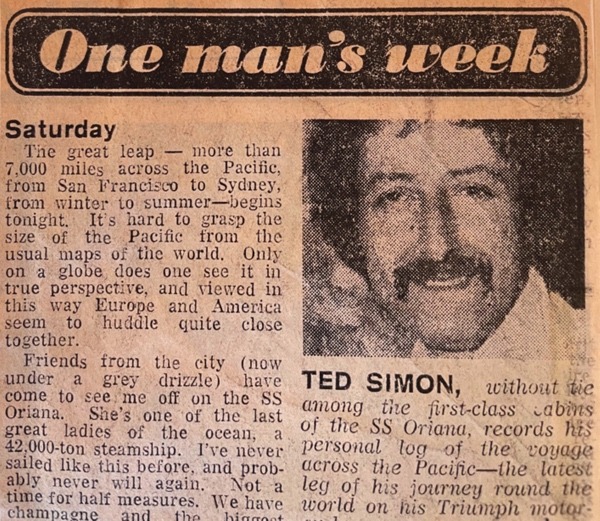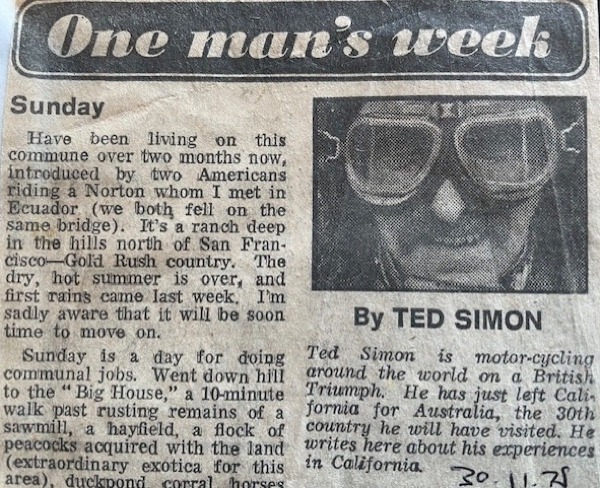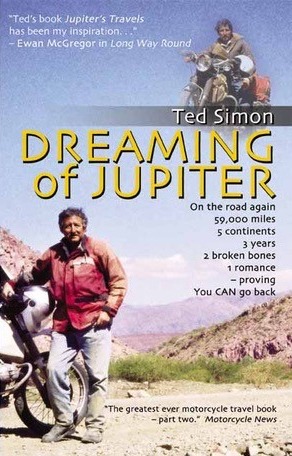Still following the story as it happened, my next stop had to be Australia. As idylls go, my idyllic time on the commune in Northern California lasted longer than most, but after almost four months I had to move on. The Sunday Times had engineered a free crossing of the Pacific for me and my bike on the P&O cruise liner SS Oriana. In return I wrote another in the series One Man’s Week (it was 1975: I don’t think they’d got around to One Woman’s Week).

Saturday
The great leap – more than 7000 miles across the Pacific, from San Francisco to Sydney, from winter to summer – begins tonight. It’s hard to grasp the size of the Pacific from the usual maps of the world. Only on a globe does one see it in true perspective and viewed in this way Europe and America seem to huddle quite close together. Friends from the city (now under a grey drizzle) have come to see me off on the SS Oriana. She’s one of the last great ladies of the ocean, a 42,000-ton steamship. I’ve never sailed like this and probably never will again. Not a time for half measures. We have champagne and the biggest streamers I have ever seen. Twelve of us packed into my cabin, laughing and crying, woven together in a cat’s cradle of coloured paper ribbon. When they leave, when I look down from the rail at their last laughing antics on the quayside below, the impending separation is a great hollowness inside me. After saying goodbye almost daily for two years I’ve become a connoisseur of farewells. A shipboard parting, I think, offers the sweetest sorrow of all.
Out of San Francisco at 6pm, under the Golden Gate (actually terra cotta) into a choppy sea. Try to get my own bearing on the ship and fail. She’s vast – an infinite progression of lounges, bars, dance floors and swimming pools. As a favour to help me on my journey P&O have given me a first-class cabin, which suits my taste better than my wardrobe. Now that the Oriana is a one-class ship, the only remaining privilege of we upper class passengers is to dine in the forward restaurant where we enjoy a more discreet atmosphere as well as the Captain’s presence. Ties and jackets, it seems, are de rigeur at dinner. My only jacket is leather, and I haven’t had a tie in more than two years. What am I to do?
Tuesday
It has taken all Sunday and Monday just to explore the ship. For all the sumptuous appointments, peculiar deck games, and opportunities for sloth and gluttony, no attraction is so splendid as the chance to fulfill childhood fantasies. There’s a fragment of some ancient newsreel that lodged itself in my infant memory – the launching of the Queen Mary perhaps. It was at about the same time that I saw the Princess Margaret Rose on her pony and planned to marry her. Anyway there were “socialites” in shining silks and tails popping off champagne corks and betting on horses in mid-Atlantic. The princess, alas, slipped through my fingers, but I shall at least get my mid-ocean horse race with bubbly. The horses (which nobody explained earlier) I now discover to be wooden. The jockeys are women passengers who sit at the wining post and furiously wind in their horses along wooden rails. I have the race card here and I see there are some very old chestnuts running. I shall put 10p on Faux Pas, by Remark out of Place, Mrs M.Polski up, and I shall try to nobble Miss N.Woodberry who is on Short Pants (by Runner out of Breath).
Dinner crisis partly resolved by Australian gentleman kindly insisting that I borrow his tie.
Thursday
I have cheated and skipped a week. We’re now eleven days out of San Francisco. (Last Thursday while I was ashore in Honolulu I went into a bookshop where the owner stared fixedly at my cameras and with virtually no preamble said “A good way to bring in cocaine is to stuff it into cameras. Have you got any in those?” I still wonder who he was working for.)
Today we came alongside at Suva in the Fiji Islands. Greeted by police band in skirts and sandals. I walk around the town and along the coast until it rains. See hardly any Fijians – mostly Asians, as in “Sunderjee’s Chinese Emporium: save more than ever before.” Come to small strip of beach where all the sea shells get up and walk away. Every one had a hermit crab inside. Yesterday never happened. We crossed the Date Line and I had to return all the hours I’ve been borrowing since I left Greenwich two years ago plus another 12 hours deposit as I proceed. So, no Wednesday.
Friday
This ship has two captains, Philip Jackson who wears four gold rings, and John Wacher who wears one very, very broad one. Since one very, very broad one beats four of a kind Wacher is boss and Jackson is deputy. No job I suppose carries greater prestige than captain of a great ocean liner but how one man can combine such wildly different roles puzzles me. Are you Captain Hornblower, or Chairman of the Board, or a Super Redcoat, I ask. He leads me briskly through the mysterious areas of the ship labelled Crew and Officers Only.
His pride in the ship could not have been simulated.
“Look at that!” he kept exclaiming as we rushed down through the bakery, past the master pastry cook, alongside the cauldron where the bone stock simmers for the soups, and further down still to the generators, the distilling plant, the refrigerating plant (all imposing enough, I thought, to drive the ship) and finally the vast boilers spewing steam into the two turbines at 800 lbs per square inch. “If that tube were to burst, we’d be cut in half. The men who worked down here in the war were awfully brave.”
Saturday
Today there is a glorious sun. A ship like this must attract a high proportion of elderly people, concentrated in the more expensive cabins, but there’s a vigorous band of young people on the lower decks. On fine days they burst up through the geriatric crust and overflow the ship. Golden Australian bodies everywhere with white triangles of zinc oxide on their noses. Action centres on the swimming pools, where they throw each other in, race with their left feet held in their right hands, retire for beer, and then repeat.
Hear of a stowaway who has been caught by a simple error. He tried to pay for his continental breakfast. Like the movies, and the tea and biscuits in bed, it’s free. Also hear that somewhere on the ship is a girl riding around the world on a motorcycle. Must track her down.
Sunday
Found her. She isn’t. Maybe I’ll still make the Guinness Book of Records. Arrive in Auckland.
New Zealand is a pretty, green old-fashioned English country. Everybody and everything seems correct, so it astonishes me to see a girl with naked breasts on a busy public beach and nobody appearing to notice, except me. Makes me happy for New Zealand. Not quite so happy with myself.
In July of 1975 I left Los Angeles with a fully functioning motorcycle (and the same silly paper air filter) and made my way to some new friends who lived south of San Francisco, and then, after a week or two, travelled North on Highway 101 to get to the commune that Bob and Annie had told me about. I lived on the commune for almost four months and halfway through that stay the Sunday Times asked me to do a column for a series they were running called One Man’s Week . I have no idea today how we communicated. No internet of course. I don’t think there was a phone on the commune. Probably it was all done through the post office. Today I would shudder at that prospect but in the seventies the post was really reliable. It had to be. There wasn’t anything else. So here it is ¬–

ONE MAN’S WEEK on a commune in California
Sunday
Have been living on this commune over two months now, introduced by two Americans riding a Norton whom I met in Ecuador (we both fell on the same bridge). It’s a ranch deep in the hills north of San Francisco – Gold Rush country. The dry, hot summer is over, and first rains came last week. I’m sadly aware that it will be soon time to move on.
Sunday is a day for doing communal jobs. Went down hill to the “Big House”, a ten minute walk past the rusting remains of a sawmill, a hayfield, a flock of peacocks acquired with the land (extraordinary exotica for this area) duckpond, corral, horses grazing in the meadow and Greta the Goat. About 20 people straggled in for breakfast from various improvised houses dotted about the land. Men and women, mostly in their twenties, who met during the great campus upheavals of the last decade. It’s an unusually well-endowed commune: 670 well-watered acres of wooded hill and meadow, with access to a fair amount of parental money to keep them well clear of the brink of survival.
Day spent digging a ditch to drain the hillside behind the house. My own idea, very satisfying after two years of moving to be physically involved in one place. Others are mucking out, bottling fruit, cleaning the septic tank, building, or simply (and acceptably) doing nothing much. No pressure, no contracts. This is a low-profile refuge from middle-class expectations. The important things get done, somehow, without rules.
Monday
People here do, clearly, love each other more than they would living conventional lives. No orgies. Fewer drugs and less promiscuity than in most London party scenes I remember. What nudity there is has more to do with sun, air and heat than sexuality so it’s scarcely even noticeable. A strong sense of family belonging. Much support for people in emotional turmoil. Little jealousy, if any. But it can be a frustrating place. There’s a real danger of stagnation. Private projects are not much liked. Communal projects are hard to get going. There’s growing awareness that some extra sense of purpose is needed now.
Logging is a powerful issue here. On the hillside above me one last stand of Douglas firs is about to get the chop. Loggers are clearing the road for the big trucks. The noise of the chainsaws and bulldozers, and the splintering crash of falling timber threatens the commune. The people here tried to stop it happening. They say it’s the last virgin fir in the area. The cabin is made of it – dense wood, often too tough for nails.
Tuesday
The Wild West show continues. Today met my first rattlesnake. Had been swimming in the Eel River. On the steep climb back left the path for a while. A sudden loud hissing and crackling stopped me short – an alarming sound like water falling on a red hot stove. The snake was a yard away. We both studied each other a while. At last, very slowly, it slithered off while I kept pace with it until it vanished among rocks. It was about three feet long, with a full rattle.
Travelling has made me much more curious than frightened with wild life. Until today, the only creature that has stood its ground was an elephant in Tanzania. The rest all galloped, leapt, flew, crawled, burrowed, swam or buzzed away.
Wednesday
Carol and I harvested lima beans in the vegetable garden – a big crop to dry out for the winter. The garden is really the heart of the commune; a ragged-looking acre at first sight, but tremendously productive. Was fascinated to learn how certain weeds and flowers (like Pigweed and Nicotinia) are used to protect vegetables and to draw minerals to the surface. No chemicals of course. Enchanted by a variety of small snakes, black and yellow striped, slithering about. They’re harmless enough, and God knows every garden should have its serpent.
Thursday
My day to cook dinner. Made a full-dress English trifle with sherry. The adults went berserk over it, but the two small girls refused to eat it saying “Yuck”. They invented a new name for me – “Slimey Limey” – which we played with for a while, but they’re remarkably good at not taking things too far. The motorcycle also has a nickname, the Green Chainsaw.
I’ve been getting my digs in too, at their California Space Language, a complete Hippy/Political/Commune vocabulary about heads, trips, spaces and places and getting it together. Can be expressive but very sloppy and they know it. I’m the only person here who usually completes a sentence. It charms them, but they have a general distrust if language and believe the most useful things can’t be said.
Friday
The big night out, to the theatre in Covelo, the nearest small town, an hour along the dirt road. A community of 2000 people full of cross-currents and contradictions. The Old White population lives mainly off ranching and logging (there’s a sawmill down there) but both activities are running down. There’s also a sizeable Indian population (Redskin, though their skins aren’t red) sadly inclined to get fat and drunk and live off welfare. Then there are the New Whites – hippies, communards, city people moving to the country, even an Englishman directing a garden research project. Some Indians have recovered their dignity and are trying to revitalise their community with help from the New Whites. The others don’t like it.
The theatre is the High School gym, an elaborate affair for a small town, and rather tasteless. The basket ball nets retract hydraulically like an aircraft undercarriage. The show was very enjoyable, though far too long. Stage swarmed with characters, all played with great gusto. In three nights they made 500 dollars.
Saturday
Just heard that I can get on the P&O liner “Oriana” from San Francisco to Sydney, so it looks like Christmas down-under. Very difficult to detach myself from this life here. It makes a perfect antidote to the blatantly extravagant life-stye of American cities. Communes may come and go, wedded to the strangest beliefs and populated by the weirdest people but the tradition of living simply on and with the land must not be lost. Those who choose this, I believe, carry a torch for all of us.
Dear friends and virtual acquaintances,
It would be nice to hear that you’ve had a wonderful few days or weeks of festive joy. I’ve certainly stretched my holiday out as long as I could, but I daren’t cut out any longer in case it becomes permanent.
When you last heard from me I was writing about my arrival in Los Angeles, and if I were to go on with these extracts and references to my notebooks, the commune in Mendocino County would come next. I wrote a piece about it for the Sunday Times and I could copy that off the cutting. But there’s something else on my mind – two things, actually.
The first is that I’ve just begun working on an account of my flirtation with agriculture. I burst onto the Organic Vegetable scene in 1986 and, in all innocence, seem to have achieved something memorable. It may turn into a book. I don’t know, but it might be a good idea to serialise it as I did with the Canary book. Would you like that?

The other thing on my mind is that it’s a lot of work keeping this sort of thing going, and although I am always glad afterwards to have done it, it’s often hard to get down to it. So this would be where you come in.
Of course my main practical reason for running a website is to sell books, but sales have been falling off for a while now, because all of you have probably already got Jupiter’s Travels, and maybe the big Camera book too. But the one book that I don’t sell enough of is Dreaming of Jupiter – a pity because it IS a good book.
If you will buy the book it will really encourage me. You don’t have to buy it from me, unless you definitely want my signature. Buy it from a bookshop, or Amazon – much cheaper. I will find out, soon enough if it’s moving. There’s a thousand or more sitting at the distributor’s warehouse and I hate the idea of them getting pulped before I get pulped myself.
Cheers to you all, and WATCH THIS SPACE.



